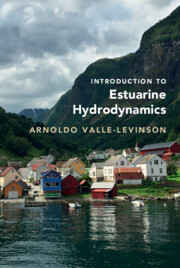Book contents
- Introduction to Estuarine Hydrodynamics
- Introduction to Estuarine Hydrodynamics
- Copyright page
- Contents
- Preface
- 1 Introduction and Classification
- 2 Conservation Equations
- 3 Tides in Semienclosed Basins
- 4 Shallow-Water Tides
- 5 Tidal Residual Flows in Homogeneous, Semienclosed Basins
- 6 Wind-Driven Flows in Homogeneous, Semienclosed Basins
- 7 Flows Driven by Density Gradients
- 8 Interactions among Tides, Density Gradients, and Wind
- 9 Fronts
- 10 Time Scales in Semienclosed Basins
- 11 Semienclosed Basins with Low or No Discharge
- 12 Classification of Semienclosed Basins, Based on Dynamics
- Index
- References
7 - Flows Driven by Density Gradients
Published online by Cambridge University Press: 24 February 2022
- Introduction to Estuarine Hydrodynamics
- Introduction to Estuarine Hydrodynamics
- Copyright page
- Contents
- Preface
- 1 Introduction and Classification
- 2 Conservation Equations
- 3 Tides in Semienclosed Basins
- 4 Shallow-Water Tides
- 5 Tidal Residual Flows in Homogeneous, Semienclosed Basins
- 6 Wind-Driven Flows in Homogeneous, Semienclosed Basins
- 7 Flows Driven by Density Gradients
- 8 Interactions among Tides, Density Gradients, and Wind
- 9 Fronts
- 10 Time Scales in Semienclosed Basins
- 11 Semienclosed Basins with Low or No Discharge
- 12 Classification of Semienclosed Basins, Based on Dynamics
- Index
- References
Summary
This chapter describes residual flows driven exclusively by density gradients. Chapter 6, in contrast, presented residual flows forced only by winds, and Chapter 5 treated residual flows from tides. This chapter begins with a qualitative description of the flow arising from density gradients established by freshwater input to a semienclosed basin, that is, the density-driven exchange flow or gravitational circulation. It then goes into a dynamical description, grounded in fundamental physics. The dynamical description first considers lateral homogeneity and then allows for lateral variations caused by Earth’s rotation. It follows by considering lateral changes in bathymetry and of the relative contribution of frictional effects versus Earth’s rotation effects. The chapter concludes by exploring the influence of basins' width on the gravitational circulation. Along-basin variations in residual flow are considered in Chapter 8.
- Type
- Chapter
- Information
- Introduction to Estuarine Hydrodynamics , pp. 98 - 123Publisher: Cambridge University PressPrint publication year: 2022

